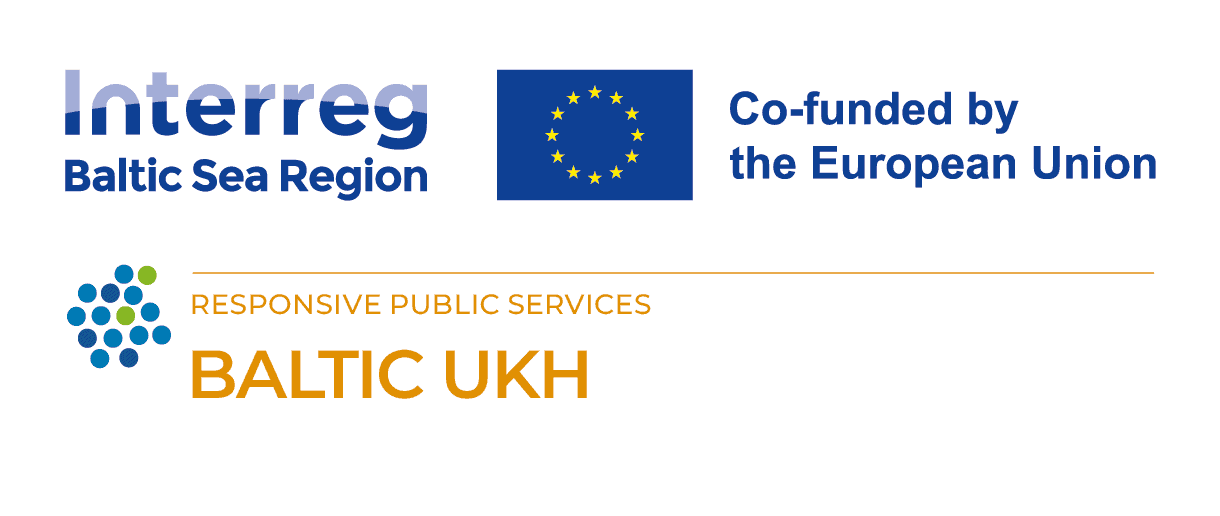
From Theory to Practice: Crafting a Toolbox for Effective User Engagement and Participation
16 August 2024
How can public information providers boost user engagement and participation? While library partners in the BALTIC UKH project develop their pilot projects, Jamie Johnston from OsloMet, a project partner, addresses this challenge by developing a practical toolbox for library and public service professionals. Moving beyond theoretical frameworks, Jamie is engaging directly with professionals who are actively involving their communities in shaping services and spaces, as well as with researchers and educators. The 4C User Engagement and Participation Toolbox will merge theoretical insights with practical experience, employing conceptual tools to guide libraries and information providers through a structured process for fostering meaningful interactions with users and partners. It will support various stages of engagement, from defining guiding principles and setting goals to implementing collaborative methods and evaluating outcomes, helping to effectively envision, develop, and reshape services and spaces. Conceptual tools will play a crucial role in this toolbox by:
- Guiding Thinking: Serving as mental frameworks that direct how public service provider staff and stakeholders approach challenges, innovations, and user needs. They help structure thinking and decision-making throughout the process.
- Structuring Engagement: Providing a structured approach to involving users in the design process, facilitating organized and effective engagement. This includes methods such as co-creation, co-design, co-production, and co-evaluation.
- Shaping Conversations: Creating a common language and reference points for discussions among diverse stakeholders. This ensures alignment and clarity in conversations about shaping future services and spaces.
- Encouraging Innovation: Pushing participants to think beyond conventional solutions, fostering creative and forward-thinking approaches.
Here’s a closer look at the key activities driving this initiative forward:

Keynote at RAILS Conference: Jamie’s journey began with her keynote presentation at the RAILS 2023 conference in New Zealand, where she introduced the preliminary theoretical framework for the toolbox, which she had discussed with the project partners during the kick-off in Hamburg. Attended by library and archive professionals from culture and heritage institutions, many of whom work with diverse cultural and social groups. The conference offered Jamie critical reflections that have significantly influenced the toolbox’s conceptual and theoretical development, particularly regarding beneficiaries and power-sharing in co-creative projects. Jamie also made a couple of visits to libraries, museums, and archives (LAM institutions) during her trip for inspiration.
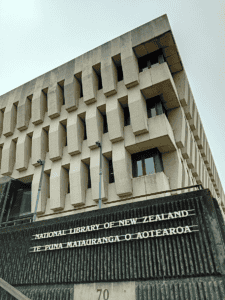
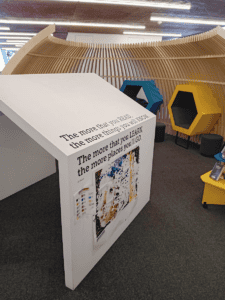
Online Workshop: Building on this foundation, Jamie hosted and participated in the BALTIC UKH International Feedback Workshop along with her project partners. This online event, which brought together professionals and experts from public and academic libraries, architecture, and pedagogy, was instrumental in refining the toolbox’s initial designs. The feedback underscored the necessity of tailoring public services to diverse user needs and maintaining ongoing community engagement, both of which are being accounted for in the toolbox.
Shadowing Project Partners: Jamie gained valuable insights into effective engagement strategies and spatial design by shadowing her project partners at the State and University Library of Hamburg (SUB). These first-hand observations provided practical examples of best practices and innovative approaches, which are now being integrated into the toolbox to ensure its relevance across various institutional settings.
Study Visits: The journey continued to other innovative educational and cultural spaces in Hamburg, which Jamie visited alongside her SUB project partners. From the Extended Library at the University of Fine Arts to the Pop-up Library at the HIBS Learning Center and Freiraum at Hamburg’s innovative design museum MK&G, these visits offered firsthand insights into flexible environments supporting diverse user activities. The strategies observed are now being translated into practical recommendations for versatile library spaces.
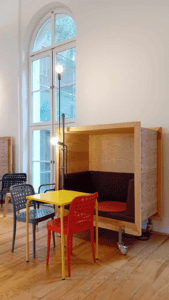
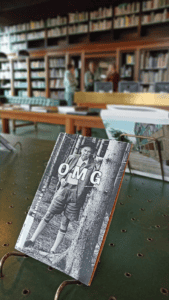
International Round Table: At the 112th German Library Congress (BiblioCon 2024), Jamie and project partners participated in an International Round Table focused on user engagement and co-creation. This event offered critical feedback on the skills and competencies necessary for successful co-creative projects. These insights have been instrumental in shaping the toolbox’s framework, ensuring it aligns with the practical needs and skill sets required for effective participatory work. Additionally, the feedback emphasized the importance of timing user engagement within a project, which is being carefully considered in the toolbox’s development.
Knowledge Synthesis: Currently, Jamie and her project partners are engaged in a comprehensive review of empirical reports and case studies from library professionals and experts in educational and cultural institutions. This synthesis involves analyzing real-world examples and practical applications, which are essential for grounding the toolbox in current best practices. By integrating these insights, the toolbox not only reflects contemporary challenges and solutions but also aligns with established methods and innovations in the field. This rigorous process ensures the toolbox remains robust, relevant, and ready to address the evolving needs of library and public service professionals.
What’s Next on the Agenda?: As Jamie moves forward, she plans to engage further with project partners and users to refine the toolbox. Digital focus group interviews with partners are scheduled for October, laying the groundwork for a detailed user survey to be distributed later in the fall. These efforts are crucial for incorporating user experiences and identifying best practices.
Additionally, an Expert Committee has been established, comprising around 10 professionals and academic researchers from diverse disciplines, including library and information science, architecture, sociology, archives, digital humanities, and computer science. This committee will convene in September to review the preliminary draft of the toolbox and provide feedback to enhance its practical relevance and conceptual robustness.
And the Journey Continues: As Jamie incorporates these insights and feedback, the toolbox is evolving into a dynamic resource designed to enhance public information services through effective user engagement and participatory initiatives. With a robust foundation built on diverse stakeholder input and continuous refinement, this toolbox promises to be a valuable guide for library and public service professionals navigating a changing environment.
A heartfelt thank you to all the library and public service professionals, researchers, and educators who have contributed their expertise and insights! Your collaboration is essential in shaping a toolbox that fosters meaningful engagement and participation.









